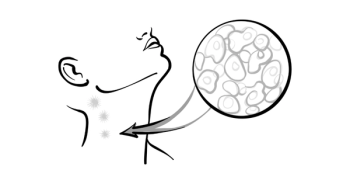
R/R MCL: Applying Data Into Clinical Practice
Javier Munoz, MD, MS, FACP: We’re fortunate to have several options and clinical trials available for this disease, but in general, 1 size does not fit all. Ibrutinib was FDA approved in 2013, as were acalabrutinib in 2017 and zanubrutinib in 2019, all in the relapsed/refractory setting for mantle cell lymphoma. This crescendo of development has been accompanied by a balancing act between efficacy and toxicity, particularly because of the off-target effects of BTK [Bruton tyrosine kinase] inhibitors. The most common toxicities noted are diarrhea, skin rash, cytopenias, hypertension, atrial fibrillation, and bleeding. These adverse events seem to be driven by inhibition of other enzymes, like TEC and EGFR. Hence the search for novel BTK inhibitors can, in theory, be more specific against BTK.
There are multiple variables that can help us make decisions when it comes to BTK inhibitors, including age, comorbidities, performance status, dosing—once per day versus twice per day—and concomitant medications like proton pump inhibitors and anticoagulants. At this juncture, I have to mention that we do not have a finalized head-to-head comparison in mantle cell lymphoma between BTK inhibitors. We’re unable to say that 1 is better than the other in mantle cell lymphoma at this point.
The NCCN [National Comprehensive Cancer Network] Guidelines also mention other options in the relapsed/refractory setting, like venetoclax-, lenalidomide-, and bortezomib-based therapies. It’s certainly a good problem to have when it comes to having so many options available for patients with mantle cell lymphoma in the relapsed/refractory setting.
KTE-X19, as we have discussed, evaluated patients with mantle cell lymphoma in the ZUMA-2 trial, which was published in the New England Journal of Medicine in April 2020, leading to approval in July 2020. This is for relapsed/refractory mantle cell lymphoma. We see slightly different inclusion and exclusion criteria.
The ZUMA-2 trial, as we said, evaluated patients with prior exposure of up to 5 prior lines of therapy. They needed to have received chemotherapy, a monoclonal antibody, and a BTK inhibitor. However, the latter verbiage is not mentioned in the current FDA-approved label.
The TRANSCEND-NHL-001 trial evaluated liso-cel, or lisocabtagene maraleucel, and it included patients with relapsed/refractory mantle cell lymphoma. Data were presented during ASH [American Society of Hematology Annual Meeting] in 2019. All in all, we’re excited about CAR [chimeric antigen receptor] T-cell evaluations in lymphomas, agnostic of the particular construct evaluated, including KTE-X19 and liso-cel. They’re all displaying exciting results.
Transcript edited for clarity.
Case: A 66-Year-Old Woman With Mantle Cell Lymphoma
History
- A 66-year-old woman diagnosed with mantle cell lymphoma in 2017
- She was treated with rituximab, dexamethasone, cytarabine + carboplatin followed by autologous stem cell rescue; achieved PR;
- Continued on rituximab maintenance therapy
- In 2019 she experienced clinical relapse and was started on acalabrutinib; achieved SD
Currently
- She complains of a 3-month history of intermittent fatigue, nausea and dyspnea on exertion
- PMH: DM, medically controlled
- PE: bilateral submandibular lymphadenopathy; otherwise unremarkable
- Labs: WBC 12 X 109/L, hemoglobin 9.8 gm/dL, plt 90,000/u, LDH 410 U/I, ANC 3100/mm3
- Lymph node biopsy: IHC; cyclin D1+, CD10+, CD20+, CD43+; FISH: t (11;14)
- C/A/P CT scan: widespread lymphadenopathy including bilateral submandibular (2.9 cm, 3.4 cm), 2 left-sided axillary lymph nodes (3.7 cm, 4.1 cm), and lumbar region (5.1 cm)
- PET/CT shows diffuse uptake of 18F-FDG in the submandibular, axillary and lumbar lymph nodes
- Beta-2-microglobulin 4.2 µg/L
- Ann Arbor stage IV; MIPI score 6.6, high risk; ECOG PS 0
- Treatment was started with fludarabine + cyclophosphamide, followed by a single infusion of CAR transduced autologous T cell









































